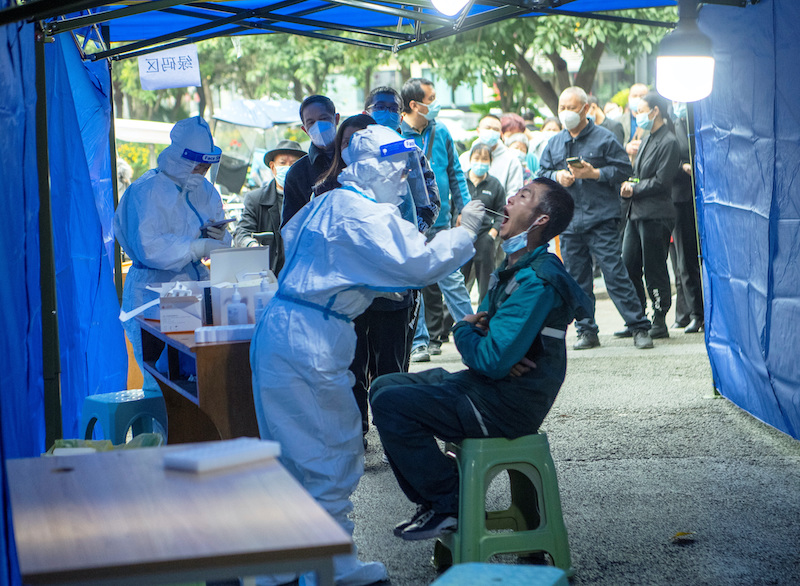More than 21 million citizens have been locked down in Chengdu, the capital of Sichuan province in China’s southwest, where four days of mass testing for Covid-19 have begun.
There is concern about outbreaks in both Chengdu and Shenzhen, the tech hub in the southeast, given these are two of the country’s biggest and most economically important cities.
Residents of Chengdu were ordered to stay home from 6pm on Thursday, but households are allowed to send one person per day to shop for necessities, the city government said in a statement.
Chengdu, which reported 157 domestically transmitted infections on Wednesday, is the largest Chinese city to be locked down since Shanghai in April and May. It remained unclear whether the lockdown would be lifted after the mass testing ends on Sunday.
Other major cities including Shenzhen in the south and Dalian in the northeast have also stepped up Covid restrictions this week, ranging from work-from-home requirements to the closure of entertainment businesses in some districts.
The moves curtail the activities of tens of millions of people, intensifying the challenges for China to minimise the economic impact of a “dynamic-zero” Covid policy that has kept China’s borders mostly shut to international visitors and make it an outlier as other countries try to live with the coronavirus.
Most of the curbs are intended to last a few days for now, although two provincial cities in northern China have extended curbs slightly beyond initial promises.
ALSO SEE: IMF Urges China Rethink on Zero-Covid, Property Crisis
Panic Buying, Volvo Plant Shuts
Chengdu’s lockdown sparked panic buying of essentials among residents.
“I am waiting in a very long queue to get in the grocery near my home,” 28-year-old engineer Kya Zhang said, adding that she was worried about access to fresh food if the lockdown is extended.
Hwabao Trust economist Nie Wen said that because Chengdu acted quickly to lock down, it was unlikely to see a repeat of Shanghai’s two-month ordeal.
Non-essential employees in Chengdu were asked to work from home and residents were urged not to leave the city unless needed. Residents who must leave their residential compounds for hospital visits or other special needs must obtain approval from neighbourhood staffers.
Industrial firms engaged in important manufacturing and able to manage on closed campuses were exempted from work-from-home requirements.
Sweden’s Volvo Cars said it would temporarily close its Chengdu plant.
Flights to and from Chengdu were dramatically curtailed, according to Flight Master data. At 10am local time (0200 GMT) on Thursday, it showed 398 flights had been cancelled at Shuangliu Airport in Chengdu, with a cancellation rate of 62%. At Chengdu’s Tianfu Airport, 79%, or 725 flights, were cancelled.
15m Affected by Shenzhen Shutdowns
In Shenzhen, which has the third-highest economic output among Chinese cities, the most populous district Baoan and tech hub Nanshan suspended large events and indoor entertainment for a few days and ordered stricter checks of digital health credentials for people entering residential compounds.
Nanshan is home to internet giant Tencent and the world’s biggest dronemaker, DJI, among other major Chinese companies.
More than half of Shenzhen’s ten districts, home to over 15 million people, have ordered blanket closure of entertainment venues and halted or reduced restaurant dining for a few days, with curbs in two districts initially planned to be lifted by the end of Thursday.
Shenzhen authorities have largely avoided shutting down offices and factories as they did during a week-long lockdown in March.
Education authorities have also postponed the start of the new school semester, which was largely planned to begin on Thursday.
Officials urged residents not to leave the city unless on urgent matters in a statement issued late on Wednesday.
It did not specify how officials would police the new requirement, but demanded government, Communist party authorities and state-owned firms make sure their employees are not making unnecessary trips outside the city.
Residents who must leave have to show proof of two negative tests within 48 hours, according to the statement.
Authorities have traced a cluster of cases to a dance hall in the city’s central business district of Futian, and were urging recent visitors there to report themselves to local health authorities.
The world’s largest electronics market at Huaqiangbei remains closed after authorities shut it on Monday.
Shenzhen reported 62 new locally transmitted Covid-19 infections for Wednesday August 31, up from 37 a day earlier.
Factory Activity Down
Data on Thursday showed that Chinese factory activity contracted for the first time in three months in August amid weakening demand, while power shortages and fresh Covid flare-ups disrupted production.
In Shanghai, schools reopened on Thursday after being closed for months.
Mainland China has reported no Covid death since May, leaving the death toll at 5,226.
- Reuters with additional editing by Jim Pollard
NOTE: This report was updated with new details on Sept 1, 2022 and the photo changed.
ALSO SEE:
Concern on Impact of Covid Curbs in China’s Big Business Hubs
China Shuts World’s Biggest Electronics Market Due to Covid
China Business Outlook is Worst Since Pandemic Erupted: S&P
Falling Business, Consumer Confidence Hinders China Recovery
























